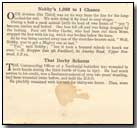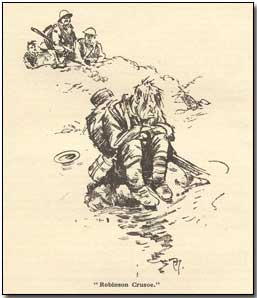Memoirs & Diaries - The Best 500 Cockney War Stories - Nobby's 1,000 to 1 Chance and Other Stories
 Published in London
in 1921, The Best 500 Cockney War Stories
comprised, in the words of its newspaper publisher (The London Evening
News) "a remembering and retelling of those war days when laughter
sometimes saved men's reason".
Published in London
in 1921, The Best 500 Cockney War Stories
comprised, in the words of its newspaper publisher (The London Evening
News) "a remembering and retelling of those war days when laughter
sometimes saved men's reason".
The collection of short memoirs, some 500 in total, is divided into five categories - Action, Lull, Hospital, High Seas and Here and There. This page contains five stories from Action, led by Nobby's 1,000 to 1 Chance.
Other sections within the collection can be accessed using the sidebar to the right.
Nobby's 1,000 to 1 Chance
Our division (the Third) was on its way from the line for the long-looked-for rest.
We were doing it by road in easy stages. During a halt a pack animal (with its load of two boxes of ".303") became restive and bolted. One box fell off and was being dragged by the lashing. Poor old Nobby Clarke, who had been out since Mons, stopped the box with his leg, which was broken below the knee.
As he was being carried away one of the stretcher-bearers said, "Well, Nobby, you've got a Blighty one at last."
"Yus," said Nobby; "but it took a fousand rahnds to knock me over."
H. Krepper (late 5th Fusiliers), 62 Anerley Road, Upper Norwood, S.E.19
That Derby Scheme
The Commanding Officer of a Territorial battalion was wounded in both hands during the third battle of Gaza in 1917. He had much service to his credit, was a lieutenant-colonel of over two years' standing, had been wounded twice before, and held the D.S.O.
He pluckily remained with his unit for thirty-six hours. Then, worn out with lack of sleep, pain, and loss of blood, and filled with disappointment at having to leave his battalion still in the fight, he trudged back to the field ambulance.
His sufferings, which had aged his appearance, and the Tommy's tunic which he wore in action, apparently misled a party of 10th London men whom he passed. They looked sympathetically at him, and one said, "Poor old blighter, 'e ought never to 'ave been called up."
Captain J. Finn, M.C., Constitutional Club, W.C.2
"Shoo-Shoo-Shooting"
There were no proper trenches in front of Armentieres in early December 1914, and a machine gun section was doing its best to build an emplacement and cover. It was in the charge of a young Londoner who in times of excitement stuttered badly.
Not being satisfied with the position of one sandbag, he hopped over those already in place, and in full view of Jerry (it was daylight too), began to adjust the sandbag that displeased him.
Jerry immediately turned a machine gun on him, but the young officer finished his work, and then stood up.
Looking towards Jerry as the section yelled to him to come down, he stuttered angrily. "I b-b-be-lieve the bli-bli-blighters are shoo-shooshoo-shoo-ting at me."
At that moment someone grabbed his legs and pulled him down. It was a fine example of cool nerve.
T.D., Victoria, S.W.1
Ancient Britons? - No!
It happened late in 1917 in Tank Avenue, just on the left of Monchyle-Preux.
It was a foul night of rain, wind, sleet, and whizz-bangs. My battalion had just been relieved, and we were making our way out as best we could down the miry communication trench. Every now and again we had to halt and press ourselves against the trench side to allow a straggling working party of the K.R.R.s to pass up into the line.
Shells were falling all over the place, and suddenly Fritz dropped one right into the trench a few bays away from where I was.
I hurried down and found two of the working party lying on the duck-boards. They were both wounded, and one of them had his tunic ripped off him by the force of the explosion. What with his tattered uniform - and what remained of it - and his face and bare chest smothered in mud, he was a comical though pathetic sight. He still clung to his bundle of pickets he had been carrying and he sat up and looked round with a puzzled expression.
One of our sergeants - a rather officious fellow - pushed himself forward.
"Who are you?" he asked. "K.R.R.s ?"
"'Course," retorted the half-naked Cockney. "Oo d'ye fink we was -Ancient Britons?"
E. Gordon Petrie (late Cameron Highlanders), "Hunky-Dory," Demesne Road, Wallington, Surrey
Desert Island - Near Bullecourt
Between Ecoust and Bullecourt in January 1918 my platoon was passing a mine crater which was half-full of water when suddenly Jerry sent one over. Six of our fellows were wounded, and one of them, a Bow Road Cockney, was hurled into the crater.
He struggled to his feet and staggered towards a pile of rubble that rose above the muddy water like an island. Arrived there, he sat down and looked round him in bewilderment.
Then: "Blimey," he muttered, "Robinson ruddy Crusoe!"
E. McQuaid (late R.S.F.), 22 Grove Road, S.W.9
Next - "Tiger's" Little Trick and four other stories
'minnie' was a term used to describe the German trench mortar minnenwerfer (another such term was Moaning Minnie).
- Did you know?

